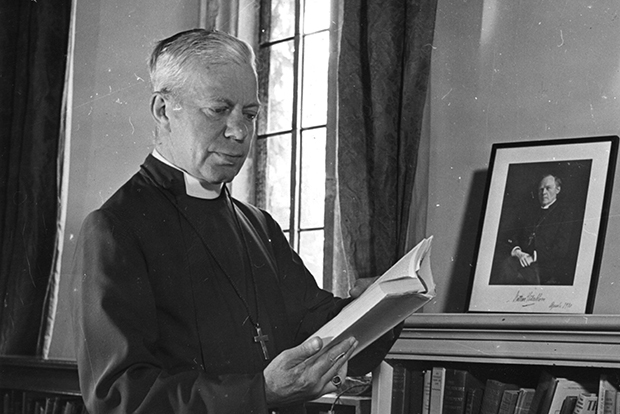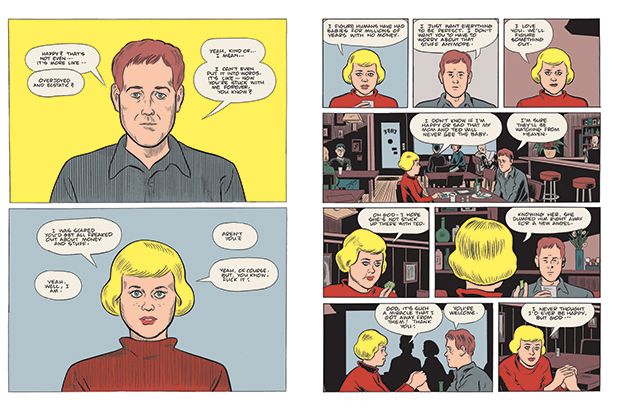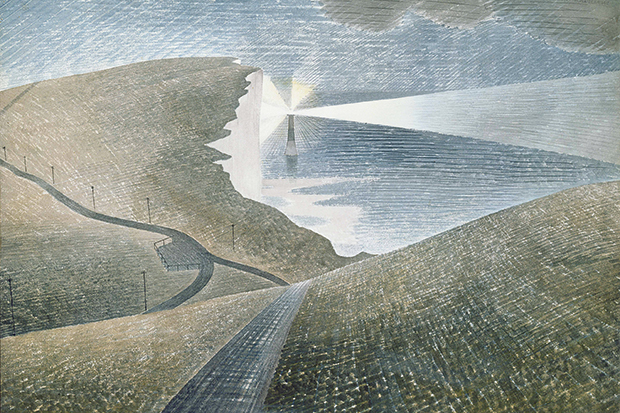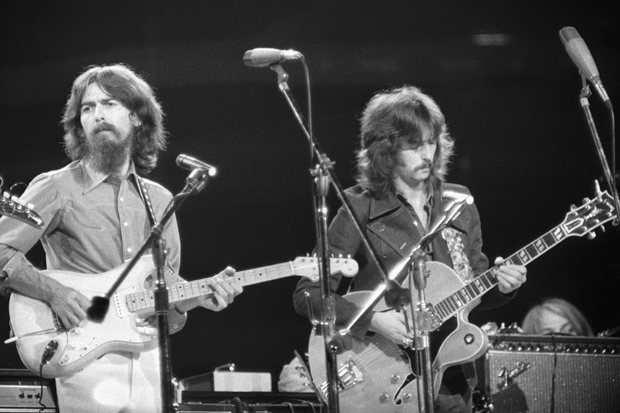George Bell (1883–1958) was, in many respects, a typical Anglican prelate of his era. He went to Westminster and Christ Church, and passed his career in the C of E’s fast stream. Never a parish priest, he became, first, chaplain (and later, biographer) of the Archbishop of Canterbury, Randall Davidson; next, Dean of Canterbury; finally, Bishop of Chichester. He was not an intellectual or a contemplative. He was an effective, energetic leader, strongly interested in public affairs, a natural candidate to end up as an archbishop of the established church.
This did not happen, probably because Bell opposed ‘area’ Allied bombing of Germany in the second world war. Such carpet-bombing threatened ‘the roots of civilisation’, he said. The British war cabinet, by permitting the indiscriminate devastation of civilian populations, was ‘blind to the harvest’.
Given the titanic nature of the struggle against Hitler, it is not surprising that many, from Winston Churchill downwards, were angry with Bell. When Bell’s office requested transport for him to visit an RAF station in his diocese, an officer there retorted: ‘Let the bugger bike.’ But Bell was not a pacifist, and he was someone who, against the trend, had always warned against the Nazis. In the 1930s and even — when contacts were minimal — in the 1940s, Bell did everything he could to support Christian resistance in Germany. Close to many of the July plotters against Hitler in 1944, he was probably the only senior English clergyman to work actively with those trying to overthrow the regime. He sought unsuccessfully to persuade the British government to back them.
This commitment explains why the last message of Pastor Dietrich Bonhoeffer, before he was murdered by the SS in April 1945, was to Bell. The principle of ‘universal Christian brotherhood which rises above all national hatreds’, Bonhoeffer said in that message, means that ‘our victory is certain’.
‘Universal Christian brotherhood’ can sound platitudinous, but the spectacle of Christians killing one another in vast numbers twice in the 20th century showed that it is all too easily forgotten. To Bell (and Bonhoeffer), it meant everything. That is why he absolutely resisted writing off all Germans. His striking way of putting it was ‘Germany was the first country in Europe to be occupied by the Nazis.’
Round this, as Andrew Chandler sets out in this learned and thoughtful book, Bell organised his thought and action: his help for Jewish refugees and persecuted ‘non-Aryan’ Christians; for all the German churches which refused to enter the stooge ‘Reichkirche’; for those detained as ‘enemy aliens’ on the Isle of Man; for a negotiated peace if Hitler were overthrown; and for those trying to rebuild Germany after its defeat.
Bell lacked political skill. As the historian Owen Chadwick put it, he was ‘the most Christian bishop of his age, but had little idea how to commend the points he wanted to press’, so most of his causes — the ecumenical movement is the great exception — did not prevail. His importance lies in his witness to the truth as he saw it. T.S. Eliot, whom Bell encouraged to write Murder in the Cathedral, described him as ‘a lovable man’. Bell had, said Eliot, ‘dauntless integrity’, and ‘no fear of the consequences’ of speaking out: ‘With this went understanding and simplicity of manner, the outward signs, I believe, of inward humility.’
Fifty-seven years after George Bell’s death, his own diocese, supported by the national Church authorities, announced that Bell had sexually abused a child between 1949 and 1953. They gave no details, and paid compensation. (The complainant later revealed herself to have been a five-year-old girl when the alleged abuse began.) The Church said it had decided against Bell ‘on the balance of probabilities’. No other such accusations — or even rumours — have ever been heard against Bell. His name was removed from buildings and institutions named after him.
A recent detailed review of the case showed that no effort had been made by the Church to consider the evidence for Bell: his voluminous papers and diaries had not been consulted, nor had living people who worked with him at that time (including one domestic chaplain, Adrian Carey, now aged 94, who spent virtually every waking moment with Bell for more than two of the years in which the abuse supposedly happened). His cause was given no legal advocate. Instead, in a process still kept secret, the ‘victim’ was believed. The normal burden of proof was reversed and so it was considered wicked to doubt her veracity.
As Chandler puts it, ‘We are asked to invest an entire authority in one testimony and to dismiss all the materials by which we have come to know the historical George Bell as mere figments of reputation.’ Of course, if Bell was guilty, his high reputation should not protect him. But we have not been given the chance to establish fairly whether he was. Jesus, of course, also suffered from unjust process. When the Church forgets this, it is not — as it claims — rejecting the dreadful child-abuse cover-ups of the past. It is dishonouring the example of its founder.
Got something to add? Join the discussion and comment below.
Get 10 issues for just $10
Subscribe to The Spectator Australia today for the next 10 magazine issues, plus full online access, for just $10.
Available from the Spectator Bookshop, £19.99. Tel: 08430 600033
You might disagree with half of it, but you’ll enjoy reading all of it. Try your first month for free, then just $2 a week for the remainder of your first year.















Comments
Don't miss out
Join the conversation with other Spectator Australia readers. Subscribe to leave a comment.
SUBSCRIBEAlready a subscriber? Log in